Tories to consider scrapping civil partnerships as gay couples opt for marriage instead
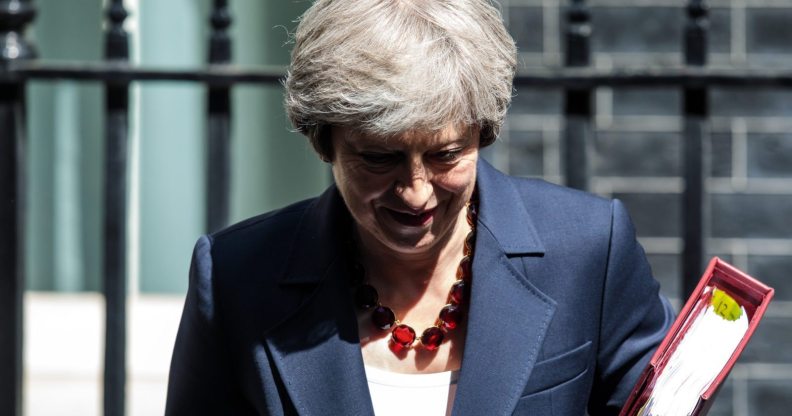
British Prime Minister Theresa May (Jack Taylor/Getty)
The government is to consider whether to scrap civil partnerships, as the vast majority of same-sex couples are opting for marriage.
Civil partnerships were introduced under the Labour government in 2004 as a segregated form of union only open to same-sex couples.
Thousands of couples initially rushed to take up the opportunity. However, following the introduction of equal marriage in 2014, the number of civil partnerships has crashed to just a few hundred a year – while many existing civil partners are opting to convert to a marriage.
In a document published last week by equalities minister Penny Mordaunt, the government outlined terms for a previously-announced review of the civil partnerships system.
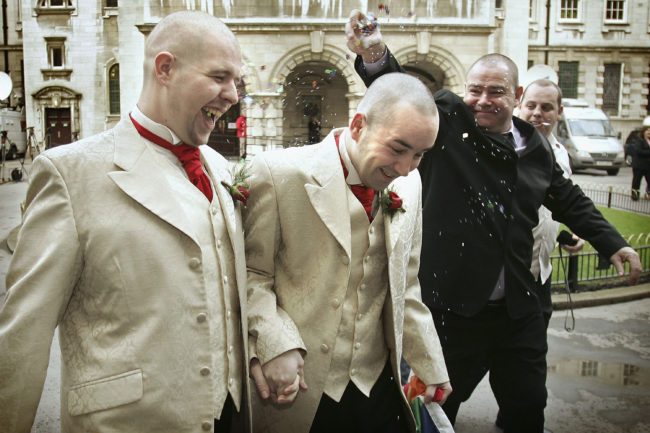
Henry Kane and Christopher Flanagan laugh as confetti is thrown at them after they becoming the United Kingdom’s second gay couple to marry in a civil partnership on December 19, 2005. (Peter acdiarmid/Getty)
The report states: “There were 890 civil partnerships registered in 2016 in England and Wales, down from an average of 6,305 from 2007 to 2013.
“The Government is already looking at available data on the take-up of civil partnerships and marriage amongst same-sex couples.
“If demand for civil partnerships remains low and this becomes a stable position, this might suggest that same-sex couples no longer see this as a relevant way of recognising their relationships, and that Government should consider abolishing or phasing out civil partnerships entirely.”
Abolition of civil partnerships may be complicated as they are currently the only form of union open to same-sex couples in Northern Ireland, due to continued failure to secure marriage equality.
However, the government also notes: “If significant demand for civil partnerships remains over time, this may indicate that the institution still has relevance.”
The report leaves the door open to the possibility of opening civil partnerships to opposite-sex couples, amid a legal challenge seeking to secure the reform.
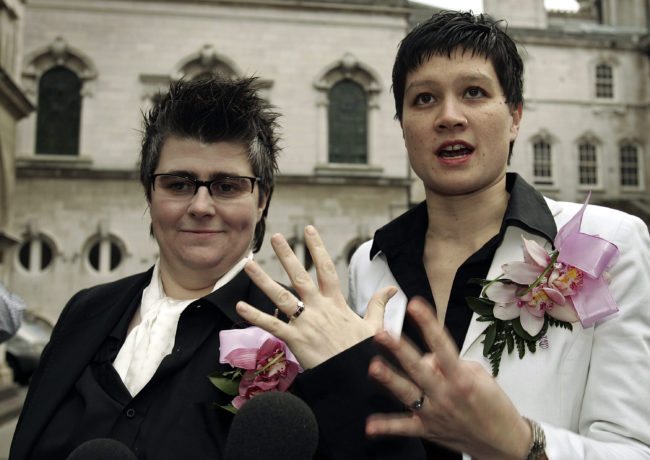
Grainne Close and Shannon Sickels show off their wedding rings after becoming the United Kingdom’s first gay couple to marry in a civil partnership on December 19, 2005. (Peter Macdiarmid/Getty)
It states: “We need an accurate and up-to-date assessment of the demand for civil partnership amongst opposite-sex couples. We intend to survey people in unmarried, opposite-sex relationships, as they are the group who would most likely be affected by a decision to extend civil partnerships to opposite-sex couples.
“The questions will be included initially in the May 2018 ONS survey and will be repeated in subsequent surveys for approximately 10 months to secure a big enough sample. We intend to analyse findings in Summer 2019.”
Whether the government ultimately decides to open up civil partnerships to all couples or seeks to abolish them, change will not be coming immediately.
The report notes: “Given the scale and significance of the decision as to the future of civil partnerships, we believe it is proportionate to gather more data so that we can be sure demand has stabilised.
“Our assessment is that by September 2019 we will have a proportionate amount of evidence to be confident in the on-going level of demand for civil partnerships amongst same-sex couples.”
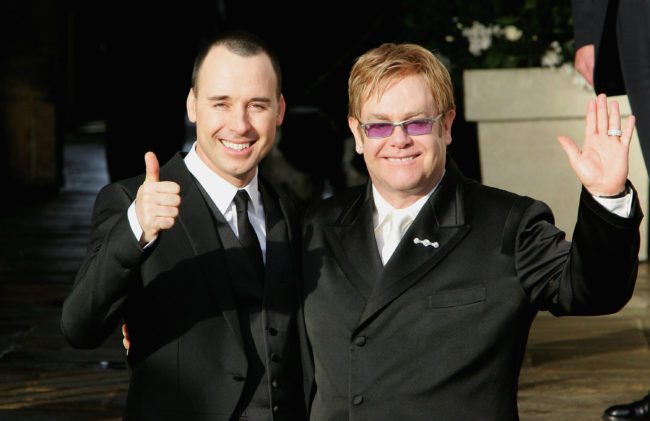
Celebrity couple Sir Elton John and David Furnish leave as a married couple following their civil partnership ceremony at the Guildhall, Windsor on December 21, 2005. (Daniel Berehulak/Getty)
“By September 2019 we will have access to four full years of data on civil partnership formation following the introduction of marriage for same-sex couples. We will also have completed the activities set out above, giving us the information we need to make a well-informed assessment of potential demand for civil partnerships by early 2020.
“Once these activities are completed the Government would be able to bring forward a set of proposals for how the law should be changed as part of a full public consultation.
“At the earliest, we would anticipate being able to consult on the future operation of civil partnerships in 2020.”
The government has held two previous consultations on the future of civil partnerships, looking at three potential options – opening them to all, closing the system to new partners but keeping it for existing civil partners, and abolishing it entirely.
However, it decided not to act on the issue at all after there was no “clear consensus” in favour of one approach.
The news comes as the Supreme Court prepares to hear an appeal from an opposite-sex couple who are seeking to enter a civil partnership.
Rebecca Steinfeld and Charles Keidan have been campaigning for civil partnership rights for some time.
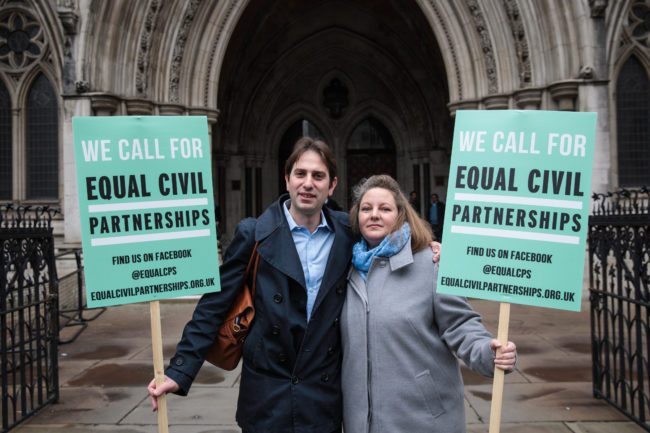
Charles Keidan and Rebecca Steinfeld pose with placards outside the Royal Courts of Justice, Strand on February 21, 2017. (Jack Taylor/Getty)
Ms Steinfeld said: “We hope the Supreme Court will deliver a judgment that will finally provide access to civil partnerships for thousands of families across the country.”
Mr Keidan said: “Civil partnerships offer a legally binding arrangement that is fair, popular and good for families and children.
“The incredible support from many thousands of people who have signed our petition and backing from MPs across the political spectrum has enabled us to come this far.
“What started out as a personal effort to become civil partners has taken on wider significance as we realised that as many as 3.3 million co-habiting couples are affected by the status quo.
“Over the last few years, we’ve heard the same message: whilst most couples want financial and legal protection for themselves and their families, not all feel comfortable with marriage.
“Civil partnerships offer a legally binding arrangement that is fair, popular and good for families and children.”
The pair are supported by an unlikely alliance including Tory MP Tim Loughton, a historic opponent of LGBT rights, alongside LGBT rights campaigner Peter Tatchell.
Mr Tatchell said: “It’s time for ‘straight’ equality. The ban on opposite-sex civil partnerships is discrimination and a violation of human rights. It is outrageous that the government is unwilling to legislate equality and that this couple are forced to go to court to get a basic human right – the right to be treated equally in law.
“It cannot be fair that same-sex couples now have two options, civil partnerships and civil marriages, whereas opposite-sex partners have only one option, marriage.
“In 2016, the Isle of Man became the first part of the British Isles to open up civil partnerships to male-female couples. If the Isle of Man can have civil partnership equality why not the UK?
“In February 2017, the Court of Appeal ruled that the current discrimination in civil partnership law could not continue indefinitely and, but in a 2:1 split decision, gave the Government limited extra time to remedy this inequality.
“Alarmingly, in order to end the current discrimination and comply with equality law, the Government is apparently now considering the abolition of same-sex civil partnerships, rather than extending them to opposite-sex couples. This would provoke a huge outcry and backlash within the LGBT+ community. It would adversely affect the 63,000 same-sex couples who’ve already entered a civil partnership, many of whom do not want to have it converted into a marriage; as well as future generations of LGBT couples who’d be forced to choose between marriage or nothing.
“The Government’s announced in February 2018 that it would undertake further research and consultation on the future of civil partnerships. This appears to be a delaying tactic. Way back in 2012, the government had a huge public consultation on opening up civil partnerships to opposite-sex couples. It found 61% in favour and only 24% opposed. So why does it need another consultation?”

